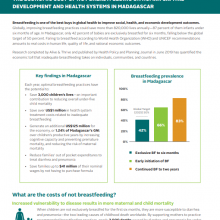Journal article
Feb 01 2022

Maternal and paternal involvement in complementary feeding in Kaduna State, Nigeria: The continuum of gender roles in urban and rural settings (Allotey, D., 2022. Maternal & Child Nutrition)
After an A&T program in Nigeria engaged fathers to support complementary feeding practices, this study investigated how household gender roles influenced child feeding in both urban and rural areas.
Journal article
Aug 18 2021

Combining intensive counseling by frontline workers with a nationwide mass media campaign has large differential impacts on complementary feeding practices but not on child growth: results of a cluster-randomized evaluation (Menon P., 2016. J of Nutr)
Complementary feeding (CF) contributes to child growth and development, but few CF programs are delivered at scale. Alive & Thrive (A&T) addressed this in Bangladesh through intensified interpersonal counseling (IPC), mass media (MM), and community mobilization (CM).
Journal article
Dec 10 2020

Assessing the Economic Feasibility of Assuring Nutritionally Adequate Diets for Vulnerable Populations in Uttar Pradesh, India: Findings from a “Cost of the Diet” Analysis (Kachwaha, S., 2020. Current Developments in Nutrition)
This study conducted surveys in Uttar Pradesh, India, to examine food prices and consumption patterns.
Journal article
Jul 16 2020

Early breastfeeding practices contribute to exclusive breastfeeding in Bangladesh, Vietnam, and Ethiopia (Nguyen, P.H., 2020. Maternal & Child Nutrition)
Data from three impact evaluations of large-scale social and behavior change communication (SBCC) interventions in Bangladesh, Vietnam and Ethiopia were used to examine whether early initiation of breastfeeding (EIBF) and non-prelacteal feeding are associated with increased prevalence of exclusiv
Journal article
Jul 16 2020

Achieving behaviour change at scale: Alive & Thrive’s infant and young child feeding programme in Bangladesh (Sanghvi, T., 2016. Maternal & Child Nutrition)
This article details Alive & Thrive’s effective strategies, approaches, and intervention design to scale-up of IYCF interventions in Bangladesh from 2010 to 2014. Keys to scale-up included synergistic partnerships with NGOs, like-minded stakeholders, and donors.
Handout
Jul 01 2020

Cost of Not Breastfeeding Advocacy Brief: Madagascar
Breastfeeding is one of the best buys in global health to improve social, health, and economic development outcomes. Globally, improving breastfeeding practices could save more than 820,000 lives annually—87 percent of them infants under six months of age.

